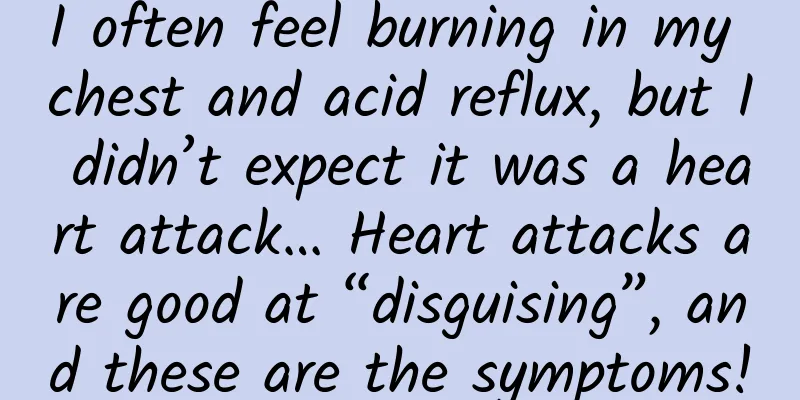I often feel burning in my chest and acid reflux, but I didn’t expect it was a heart attack… Heart attacks are good at “disguising”, and these are the symptoms!

|
"I was originally sent here to treat reflux, but ended up receiving emergency treatment in the cardiology department!" Uncle Wang (pseudonym), who is in his early 60s, his heart was still pounding as he talked about the thrilling scene he had experienced. I thought it was "reflux", but it turned out to be a blocked cardiovascular system. Uncle Wang was usually in good health, and he ate and drank freely, but he had more and more problems. In the past two years, he was troubled by chest burning and acid reflux. As time went by, his attacks became more and more frequent, 3-4 times a day, each lasting several minutes, which was very uncomfortable. He was diagnosed with reflux esophagitis at a local hospital. After taking acid-suppressing drugs, the symptoms did ease, but they would relapse once he stopped taking them. Recently, Uncle Wang's symptoms suddenly worsened. The frequency of attacks increased, the duration prolonged, and he also had chest pain and sweating. His sleep quality dropped sharply, his appetite was not as good as before, and he lost more than 10 pounds in just two months. Through someone's introduction, he learned that the Hernia Surgery Department of Zhejiang Provincial People's Hospital was good at "gastroesophageal reflux" surgery. Five days ago, my uncle came to the expert clinic of Wang Zhifei, the director of the Hernia Surgery Department of the hospital, to prepare for hospitalization for surgery. Unexpectedly, this decision became a turning point for him to escape danger. "Chest pain, sweating..." After learning about the patient's condition in detail, Director Wang keenly realized that this might not be simple reflux esophagitis. "His symptoms are very similar to angina pectoris, and further examination by the cardiology department is required." After hearing the doctor's analysis, the uncle and his family were unprepared and panicked. They said they came to treat common "reflux", but how could they suddenly have heart disease? If there was a heart problem, wouldn't it be very dangerous? Director Wang comforted the uncle and immediately contacted Chief Physician Ding Yahui, Deputy Director of the Department of Cardiology. "The hospital's chest pain center involves multiple disciplines, and the long-term cooperation has formed a tacit understanding." After receiving the call and listening to the description of the condition, Director Ding Yahui immediately arranged blood and electrocardiogram tests for the uncle. The results showed that he had signs of myocardial infarction! "Fortunately, the patient received medical treatment in time, otherwise the consequences would be disastrous." Without further ado, Ding Yahui immediately arranged for Uncle Wang to be hospitalized, and quickly pushed Uncle Wang into the cardiac catheterization room for emergency coronary angiography. As expected, the examination results showed that the opening of Uncle Wang's left anterior descending coronary artery was more than 90% narrowed, and the blood flow in the artery had slowed down significantly, and the situation was very critical. Director Ding Yahui and others immediately performed a coronary artery stent implantation operation, successfully opening the severely blocked blood vessels. After the operation, Uncle Wang's chest pain and other symptoms completely disappeared. Back in the ward, Uncle Wang, who had just recovered from his shock, murmured to himself: What a close call! After further medical care from the cardiology staff, Uncle Wang recovered well and was discharged from the hospital today. Ding Yahui (first from left) is making rounds at the hospital. Photo provided by "Versatile" myocardial infarction, good at "making a feint to the east and attacking in the west" "In the medical field, diseases often play the 'feint to the east and attack in the west' drama, confusing doctors and patients with atypical symptoms. Myocardial infarction is such a 'master performer'. It often disguises itself as other diseases, posing a great challenge to clinical diagnosis." Director Ding Yahui, who has been practicing medicine for 20 years, said that some patients have only a superficial understanding of the disease and do not take it seriously, or even are unwilling to cooperate, which puts them in danger. Aunt Zeng (pseudonym), who is over 70 years old, had stomach discomfort for more than half a year. She had undergone gastroscopy and colonoscopy and found no obvious abnormalities. But one day, she had stomach pain again and came to Zhejiang Provincial People's Hospital. After the doctor saw the old lady, he learned that she not only had stomach pain, but also a slight chest pain. He became alert and asked the old lady to do an electrocardiogram and then check her troponin. The electrocardiogram showed no obvious problems, but soon the creatinine protein reported a dangerous value... The doctor quickly called the old man who was waiting for the test report. Unexpectedly, the old man replied on the phone that it was an old problem and he felt that it was not a big problem and had gone home. The doctor was very anxious and explained the condition over and over again. "Isn't it just a stomachache? How does it relate to a heart attack?" The old man felt annoyed by the back and forth and also thought that the doctor was worrying too much. Time passed by, and after more than an hour of tug-of-war, the old woman finally agreed to return to the hospital. At this time, her chest pain was more obvious. The doctor immediately performed a routine examination, and the electrocardiogram had already changed dynamically... The doctor performed coronary angiography, and the patient's entire anterior descending coronary artery was occluded. After drug balloon dilatation, blood flow was restored. "I have encountered various atypical myocardial infarctions. In addition to the more common 'stomach pain', there are also back pain, toothache, shoulder pain, neck pain, etc. It is not uncommon for myocardial infarctions to be missed or misdiagnosed." Director Ding Yahui said that both doctors and patients should be vigilant and pay close attention to persistent discomfort symptoms. In the face of complex or persistent symptoms, one should not be limited to a single diagnosis. Comprehensive examinations and evaluations, including electrocardiograms, blood tests, etc., are essential to promptly detect potential serious problems. "Of course, we should not treat all stomach pain as myocardial infarction and cause panic. For middle-aged and elderly people with severe symptoms and poor response to stomach medicine, especially those with risk factors for coronary heart disease such as hypertension, diabetes, high blood lipids, and smoking, they should be vigilant when they experience stomach discomfort, especially when the onset or aggravation of symptoms is related to activities or emotional excitement, and the possibility of angina pectoris or myocardial infarction should be ruled out." Chest pain: rule out heart disease first Epidemiological surveys show that the incidence of non-cardiac chest pain is 20-30%, and gastroesophageal reflux is one of them. "Gastroesophageal reflux and angina pectoris and myocardial infarction do have some similar symptoms, such as chest pain, chest tightness, heartburn, etc., which can easily confuse patients and even doctors." Director Ding Yahui also pointed out some differences between the two diseases. Different attack times : Reflux esophagitis is often related to fullness and bed rest, and often occurs in the second half of the night. Angina pectoris is usually related to increased activity or emotional excitement, because at this time the heart's burden is increased, oxygen consumption increases, and the narrowed coronary arteries cannot provide enough blood flow. Symptom relief is different : Reflux esophagitis symptoms can usually be relieved by taking acid-suppressing drugs or changing body positions, while angina patients often need to rest or take nitroglycerin to relieve symptoms. Different accompanying symptoms : Angina pectoris is often accompanied by sweating, nausea, syncope and other symptoms, while reflux esophagitis rarely has these symptoms. Director Wang Zhifei said that some differences between the two diseases are difficult for ordinary people to accurately judge. Therefore, it is recommended that everyone, especially the middle-aged and elderly, should seek medical attention and undergo a comprehensive examination in a timely manner if they experience persistent chest pain, chest tightness and other symptoms. Frost is the last solar term in autumn. As autumn and winter turn around, cold air becomes more frequent, and the temperature difference between day and night increases, which can easily cause cardiac chest pain; when the weather is cool and the appetite is good, people eat and drink a lot, which is also the time when gastroesophageal reflux disease increases. Experts agree that anyone experiencing chest pain should first go to the hospital to rule out heart disease to avoid delaying emergency treatment; at the same time, the following situations should alert you to the possibility of heart disease: First, symptoms are related to the amount of activity: they worsen during exercise or emotional excitement and are relieved after rest. 2. Special location of symptoms: The pain is located behind the sternum or on the left chest, and may radiate to the left shoulder, left arm, neck, and mandible. 3. Accompanied by other symptoms: such as profuse sweating, nausea and vomiting, palpitations and shortness of breath, etc. 4. High-risk groups: People who smoke, are obese, have high blood pressure, high blood lipids, and diabetes are more likely to suffer from heart disease. |
<<: Manyi•Issue 212 | What should diabetic patients do if they experience hypoglycemia?
>>: Would you like to sleep better by staying away from this product?
Recommend
Irregular menstruation after surgery
Surgery is a very damaging treatment method. Afte...
Is lard really nutritious and safe?
Many places have the custom of slaughtering pigs ...
Can I have a baby if I eat chaste berry?
Many friends have discussed the issue of pregnanc...
Calcium supplementation for breastfeeding mothers
I believe everyone knows the importance of calciu...
What impact will Kobe's death have on the NBA? How did Kobe's private helicopter crash?
I still can't believe that Kobe has passed aw...
What causes ovarian dysfunction?
If a female friend wants to get pregnant, first o...
Signs of good recovery of uterus after medical abortion
After becoming pregnant, women may be forced to a...
Should I rest well or walk more after medical abortion?
Not every pregnant woman can have medical abortio...
What should be done about breast development in adolescent girls
A girl's breasts undergo significant changes ...
Can I drink black chicken soup during my period? What is the best pot to cook black chicken soup?
Women are usually cold-natured, prone to cold han...
Foul odor
A fishy odor in the genitals is a symptom that ma...
What causes pain in the right breast of women?
Women may experience pain and discomfort in their...
Is it normal to have a decrease in fetal movement in the 6th month of pregnancy?
If you are six months pregnant, you are in the mi...









